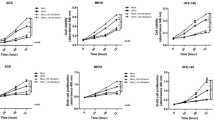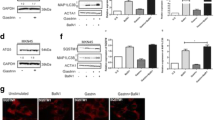Abstract
Gastrin and cholecystokinin-B receptor (CCK-B) were co-expressed in human gastric carcinoma tissues, suggesting that a functional autocrine loop, the gastrin and CCK-B receptor loop, may be presented in gastric cancer cells and play an important role in the pathogenesis and progression of gastric carcinomas. The present study was aimed at studying the effects of blocking the gastrin and CCK-B receptor loop on cell proliferation and apoptosis in gastric cancer cell line SGC-7901 cells (SGC-7901 cells). First, the expression of gastrin and CCK-B receptor mRNAs and gastrin protein in SGC-7901 cells were measured by RT-PCR and immunocytochemistry, respectively. Radioimmunoassay (RIA) was used to detect the concentrations of gastrin in culture medium. The gastrin–CCK-B receptor axis was blocked by using a specific neutralizing antibody against human gastrin and siRNA specifically targeting human CCK-B receptors, respectively. Flow cytometry was used to measure the cell cycle and apoptotic cells, and western blotting was used to measure the expression of CCK-B receptor, caspase-3, and matrix metalloproteinase-2 (MMP-2) in cells. The results showed that SGC-7901 cells not only coexpressed gastrin and CCK-B receptor mRNAs, but also endogenously secreted gastrin protein into the culture medium, thus forming gastrin–CCK-B receptor autocrine loop. Biologically, disrupting gastrin–CCK-B receptor autocrine loop by neutralizing the endogenous gastrin or by knocking down CCK-B receptor expression significantly inhibited the cell proliferation and decreased the percentage of cells residing in the S-phase of the cell cycle, and meanwhile promoted cell apoptosis and increased caspase-3 expression as well as decreased MMP-2 expression. An autocrine loop between endogenously secreted gastrin and CCK-B receptors may play a key role in the regulation of cell proliferation and apoptosis in SGC-7901 cells.







Similar content being viewed by others
References
Ferrand A, Wang TC (2006) Gastrin and cancer: a review. Cancer Lett 238:15–29. doi:10.1016/j.canlet.2005.06.025
Dockray GJ (1999) Gastrin and gastric epithelial physiology. J Physiol 518:315–324. doi:10.1111/j.1469-7793.1999.0315p.x
Sun FP, Song YG (2003) G and D cells in rat antral mucosa: an immunoelectron microscopic study. World J Gastroenterol 9:2768–2771
Watson SA, Grabowska AM, EI-Zaatarim M, Takhar A (2006) Gastrin—active participant or bystander in gastric carcinogenesis? Nat Rev Cancer 6:936–946. doi:10.1038/nrc2014
Aly A, Shulkes A, Baldwin GS (2004) Gastrins, cholecystokinins and gastrointestinal cancer. Biochim Biophys Acta 1704:1–10. doi:10.1016/j.bbcan.2004.01.004
Tu S, Chi AL, Lin S et al (2007) Gastrin regulates the TFF2 promoter through gastrin-responsive cis-acting elements and multiple signaling pathways. Am J Physiol Gastrointest Liver Physiol 292:G1726–G1737. doi:10.1152/ajpgi.00348.2006
Pagliocca A, Wroblewski LE, Ashcroft FJ, Noble PJ, Dockray GJ, Varro A (2002) Stimulation of the gastrin-cholecystokinin (B) receptor promotes branching morphogenesis in gastric AGS cells. Am J Physiol Gastrointest Liver Physiol 283:G292–G299. doi:10.1152/ajpgi.00056.2002
Konturek PC, Konturek SJ, Bielanski W, Kania J, Zuchowicz M, Hartwich A, Rehfeld JF, Hahn EG (2003) Influence of COX-2 inhibition by rofecoxib on serum and tumor progastrin and gastrin levels and expression of PPARgamma and apoptosis-related proteins in gastric cancer patients. Dig Dis Sci 48:2005–2017. doi:10.1023/A:1026387908165
Ogasa M, Miyazaki Y, Hiraoka S, Kitamura S, Nagasawa Y, Kishida O, Miyazaki T, Kiyohara T, Shinomura Y, Matsuzawa Y (2003) Gastrin activates nuclear factor kappaB (NFkappaB) through a protein kinase C dependent pathway involving NFkappaB inducing kinase, inhibitor kappaB (IkappaB) kinase, and tumour necrosis factor receptor associated factor 6 (TRAF6) in MKN-28 cells transfected with gastrin receptor. Gut 52:813–819
Song DH, Rana B, Wolfe JR, Crimmins G, Choi C, Albanese C, Wang TC, Pestell RG, Wolfe MM (2003) Gastrin-induced gastric adenocarcinoma growth is mediated through cyclin D1. Am J Physiol Gastrointest Liver Physiol 285:G217–G222. doi:10.1152/ajpgi.00516.2002
Lee HK, Lee HJ, Hur K, Lee HS, Kim WH, Michaeli D, Choe KJ, Yang HK (2005) Growth effect of gastrin on gastric cancer and its clinical implications for gastric cancer surgery. Oncol Rep 14:383–388
Konturek PC, Konturek SJ, Bielanski W, Karczewska E, Pierzchalski P, Duda A, Starzynska T, Marlicz K, Popiela T, Hartwich A, Hahn EG (1999) Role of gastrin in gastric cancerogenesis in Helicobacter pylori infected humans. J Physiol Pharmacol 50:857–873
Triantafillidis JK, Merikas E, Govosdis V, Konstandellou E, Cheracakis P, Barbatzas C, Tzourmakliotis D, Peros G (2003) Increased fasting serum levels of growth hormone and gastrin in patients with gastric and large bowel cancer. Hepatogastroenterology 50:cclvi–cclx
Konturek SJ, Konturek PC, Bielanski W, Karczewska E, Zuchowicz M, Hartwich A, Rehfeld JF, Goetze JP, Hahn EG (2003) Serum progastrin and its products, gastric acid secretion and serum pepsinogen I in gastric cancer. Digestion 68:169–177. doi:10.1159/000075553
Hur K, Kwak MK, Lee HJ, Park DJ, Lee HK, Lee HS, Kim WH, Michaeli D, Yang HK (2006) Expression of gastrin and its receptor in human gastric cancer tissues. J Cancer Res Clin Oncol 132:85–91. doi:10.1007/s00432-005-0043-y
Zhao MD, Hu XM, Sun DJ, Zhang Q, Zhang YH, Meng W (2005) Expression of some tumor associated factors in human carcinogenesis and development of gastric carcinoma. World J Gastroenterol 11:3217–3221
Zhou JJ, Chen ML, Zhang QZ, Hu JK, Wang WL (2004) Coexpression of cholecystokinin-B/gastrin receptor and gastrin gene in human gastric tissues. World J Gastroenterol 10:791–794
McWilliams DF, Watson SA, Crosbee DM, Michaeli D, Seth R (1998) Coexpression of gastrin and gastrin receptors (CCK-B and delta CCK-B) in gastrointestinal tumour cell lines. Gut 42:795–798
Dickson JH, Grabowska A, El-Zaatari M, Atherton J, Watson SA (2006) Helicobacter pylori can induce heparin-binding epidermal growth factor expression via gastrin and its receptor. Cancer Res 66:7524–7531
Watson SA, Morris TM, McWilliams DF, Harris J, Evans S, Smith A, Clarke PA (2002) Potential role of endocrine gastrin in the colonic adenoma carcinoma sequence. Br J Cancer 87:567–573. doi:10.1038/sj.bjc.6600509
Wu H, Rao GN, Dai B, Singh P (2000) Autocrine gastrins in colon cancer cells up-regulate cytochrome c oxidase Vb and down-regulate efflux of cytochrome c and activation of caspase-3. J Biol Chem 275:32491–32498. doi:10.1074/jbc.M002458200
Varro A, Kenny S, Hemers E, McCaig C, Przemeck S, Wang TC, Bodger K, Pritchard DM (2007) Increased gastric expression of MMP-7 in hypergastrinemia and significance for epithelial-mesenchymal signaling. Am J Physiol Gastrointest Liver Physiol 292:G1133–G1140. doi:10.1152/ajpgi.00526.2006
Cramer T, Jüttner S, Plath T, Mergler S, Seufferlein T, Wang TC, Merchant J, Höcker M (2008) Gastrin transactivates the chromogranin A gene through MEK-1/ERK- and PKC-dependent phosphorylation of Sp1 and CREB. Cell Signal 20:60–72. doi:10.1016/j.cellsig.2007.08.016
Sinclair NF, Ai W, Raychowdhury R, Bi M, Wang TC, Koh TJ, McLaughlin JT (2004) Gastrin regulates the heparin-binding epidermal-like growth factor promoter via a PKC/EGFR-dependent mechanism. Am J Physiol Gastrointest Liver Physiol 286:G992–G999. doi:10.1152/ajpgi.00206.2002
Beales IL, Ogunwobi OO (2009) Glycine-extended gastrin inhibits apoptosis in Barrett’s oesophageal and oesophageal adenocarcinoma cells through JAK2/STAT3 activation. J Mol Endocrinol 42:305–318. doi:10.1677/JME-08-0096
He H, Yim M, Liu KH, Cody SC, Shulkes A, Baldwin GS (2008) Involvement of G proteins of the Rho family in the regulation of Bcl-2-like protein expression and caspase 3 activation by Gastrins. Cell Signal 20:83–93. doi:10.1016/j.cellsig.2007.08.018
Song DH, Kaufman JC, Borodyansky L, Albanese C, Pestell RG, Wolfe MM (2005) Gastrin stabilises beta-catenin protein in mouse colorectal cancer cells. Br J Cancer 92:1581–1587. doi:10.1038/sj.bjc.6602509
Pradeep A, Sharma C, Sathyanarayana P, Albanese C, Fleming JV, Wang TC, Wolfe MM, Baker KM, Pestell RG, Rana B (2004) Gastrin-mediated activation of cyclin D1 transcription involves beta-catenin and CREB pathways in gastric cancer cells. Oncogene 23:3689–3699. doi:10.1038/sj.onc.1207454
Acknowledgment
We are grateful to Dr. Guo YangBiao (Department of Biochemistry and Molecular Biology, School of Basic Medical Science, Sichuan University, Chengdu, China) and Yan WenXiu (Department of Pathology, Guiyang Medical University) for their many contributions to this paper. This work was supported by National Natural Science Foundation of China, No. 30560038, the Science and Technology Foundation of GuiZhou Province (No. [2007] 2084), and the Project of International Cooperation in Science and Technology of Guizhou Province (No. [G] 700119).
Author information
Authors and Affiliations
Corresponding author
Rights and permissions
About this article
Cite this article
Zhou, J.J., Chen, M.L., Zhang, Q.Z. et al. Blocking gastrin and CCK-B autocrine loop affects cell proliferation and apoptosis in vitro. Mol Cell Biochem 343, 133–141 (2010). https://doi.org/10.1007/s11010-010-0507-5
Received:
Accepted:
Published:
Issue Date:
DOI: https://doi.org/10.1007/s11010-010-0507-5




